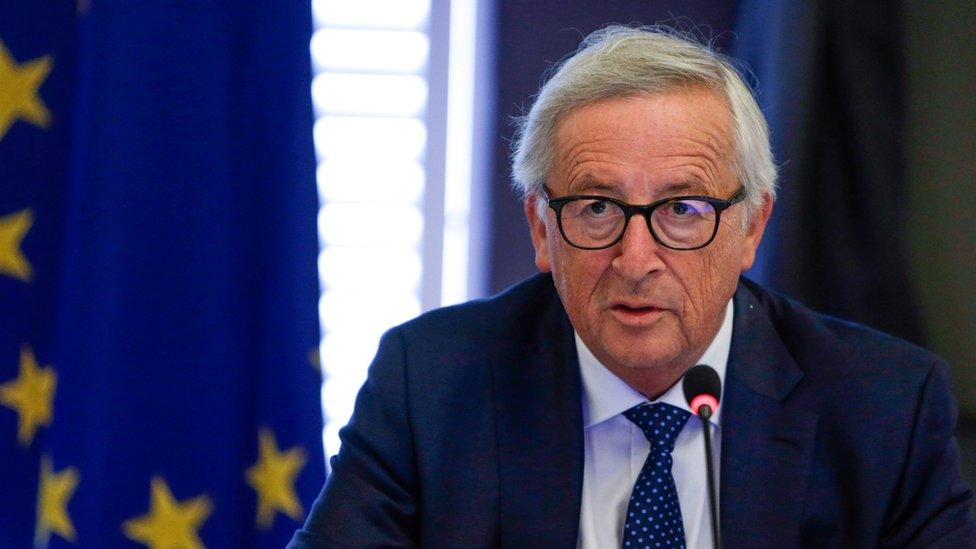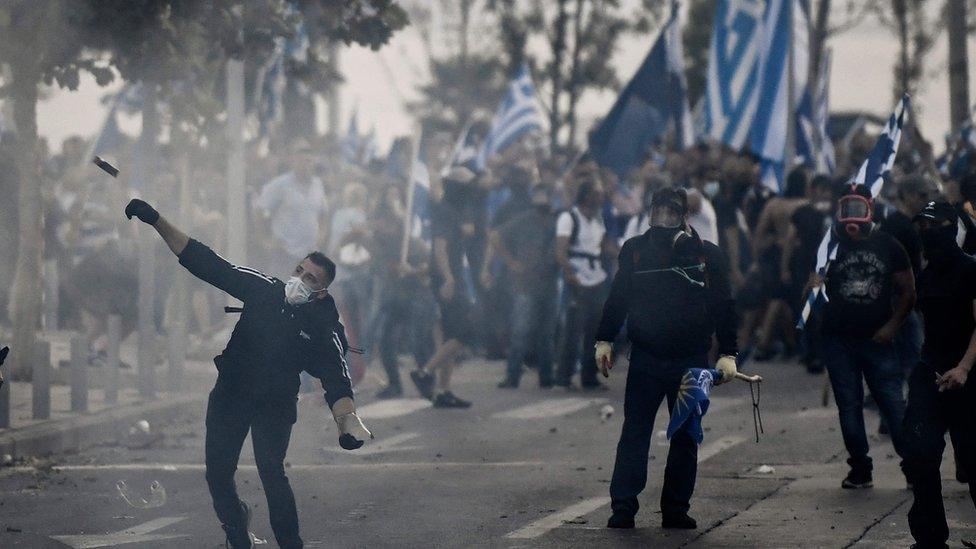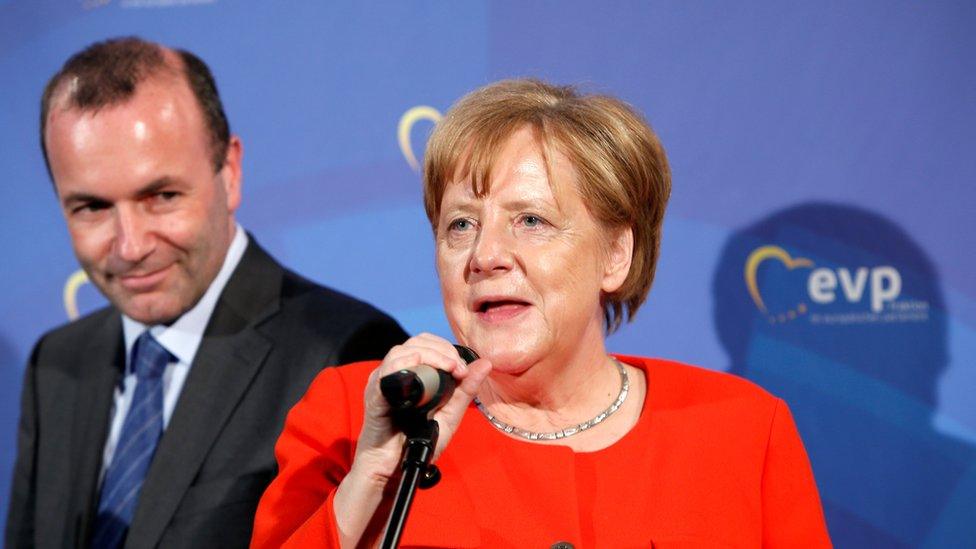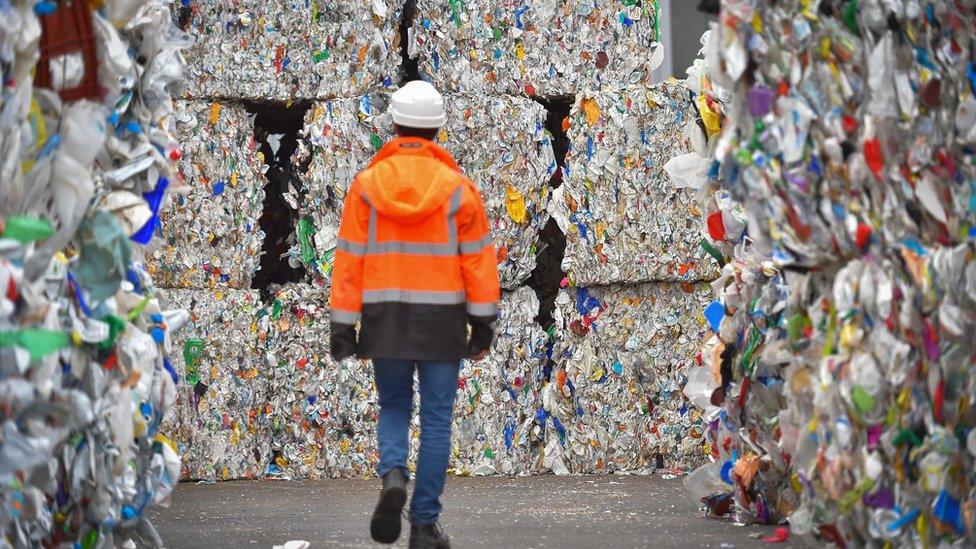Week ahead in the European Parliament
- Published

The summer break is over for MEPs, and a busy in-tray awaits them at their first plenary sitting after the recess this week.
On Wednesday, Jean-Claude Juncker will make his final 'state of the union' speech as president of the European Commission.
It will also be his last before the European elections next spring, providing a chance to vivify political priorities before the inevitable legislative slowdown next year.
Last year the speech had an upbeat tone and a slew of new policies - but will this year's effort call for a more valedictory approach?
And if so, will he have anything new to say about Brexit, having said last year that the UK's exit is "not the future of Europe"?
Mr Juncker will not be the only high-profile speaker this week, with a trio of European prime ministers set to make appearances at the podium.
Notably, Hungarian PM Viktor Orban has pledged to get into the ring for Tuesday afternoon's debate on whether his government has breached EU values.
And on Wednesday MEPs will vote on a controversial proposal to overhaul the EU's copyright laws for the internet era.
Here's what's coming up this week...
Monday
First up MEPs will discuss legislation to finance an EU volunteering scheme for young people which was launched in 2016.
The EU Commission hopes the so-called European Solidarity Corps will provide volunteering placements and job training to 100,000 young people by 2020.
They will also debate an advisory report urging the EU to continue support for peace projects in Northern Ireland after Brexit.
The report, drafted by the regional affairs committee, says financial contributions should continue beyond 2020, when the current EU long-term budget ends.
Jean-Claude Juncker indicated earlier this year that funding could carry on, suggesting MEPs may be pushing at a reasonably open door on the issue.
The evening will see short presentations of no less than seven "own initiative" reports from committees with suggestions for new EU policies.
One suggests the bloc's regime for recognising the equivalency of financial services rules in non-EU countries should get greater scrutiny from MEPs.
Another - very lengthy - report has various recommendations for member states on tackling bullying and sexual harassment in the workplace.
Among them: that all EU states should submit gender-balanced electoral lists for next year's European Parliament elections, and for the EU's definition of illegal hate speech to be expanded in an effort to tackle "gender-based" online harassment.
Tuesday
The sitting will begin with a speech from Greek Prime Minister Alexis Tsipras, the latest in the assembly's series of orations from European leaders.
It comes after Greece last month emerged from its three-year eurozone emergency bailout programme to tackle its debt crisis.
He will also get a chance to defend his government's deal to end a long-running naming dispute with neighbouring Macedonia.

The naming deal has provoked protests in Greece
The agreement to rename the country the Republic of North Macedonia faces a referendum vote among Macedonian voters later this month.
(On Thursday, Macedonian Prime Minister Zoran Zaev will get his own chance to appeal to voters when he makes his own speech in the assembly.)
The afternoon session will begin with a debate about whether the EU should take disciplinary measures against Hungary for violating the bloc's values.
On Wednesday MEPs will vote on a draft motion urging member states to trigger Article 7 of the EU's treaties against Budapest, over issues such as its respect for academic freedom and its treatment of migrants.
This procedure could technically lead to a country's voting rights being suspended - but it's unlikely because all the other states have to vote in favour.
Some MEPs are deeply worried at what they see as authoritarian drift. However expect Mr Orban to be combative in his defence of his record.
The vote is quite the conundrum for German MEP Manfred Weber, who has faced criticism for allowing Mr Orban's Fidesz party to continue to sit in the centre-right EPP group he leads.
Last week added another plot twist, with Mr Weber throwing his hat into the ring to be the EPP's candidate to head the next European Commission.

Manfred Weber (L) leads the largest group in the European Parliament
After this, MEPs will debate controversial proposals to overhaul EU copyright rules for the internet era.
The proposals are being re-examined after MEPs voted in July not to begin negotiations based on a blueprint endorsed by the legal affairs committee.
The committee had faced criticism for backing plans to place more responsibility on websites to check for copyright infringements, and forcing platforms to pay for linking to news.
And some MEPs aren't happy either about the committee's idea to extend certain copyright protections currently afforded to authors and performers to "sport event organisers".
Longstanding copyright critic Julia Reda and Tory MEP Dan Dalton teamed up last week, external to argue the provision could lead to fans being banned from sharing selfies or videos inside sports stadiums.
All MEPs will get the chance on Wednesday to amend the committee's position before their negotiators begin official talks on the overhaul with member states.
Also, the afternoon will see debate on two doorstopper reports from the foreign affairs committee about the EU's relations with the US and China.
One point of interest from the China report is support for the European Commission's plan to introduce an EU-wide 'screening mechanism' to assess Chinese investment in infrastructure projects.
There will also be a debate about the evacuation of migrants from camps around Tripoli following fighting between rival militia factions.
In the evening, MEPs will debate a proposal to revise the rules on bringing cash into the EU.
Under the plans the €10,000 declaration threshold should also include cash sent in postal parcels, prepaid cards and precious metals like gold.
Wednesday
Jean-Claude Juncker's keynote speech will start at 08.00 BST and will be followed by interventions from leading and backbench MEPs.
The main event at the voting session from 11.30 BST will be the voting on the huge set of amendments to the aforementioned copyright overhaul.
The vote on the motion relating to Hungary will also be worth watching out for later in the session.
The afternoon will begin with a debate on the future of pensions and negotiations for next year's EU budget, after governments set out their stall, external last week.
MEPs will also debate an advisory report from the environment committee on the EU's strategy for reducing plastic waste launched earlier this year.
The plan, launched by the European Commission, would mean all plastic packaging should be designed to be recyclable or reusable by 2030.
The committee's report, which will be put to a vote on Thursday, also advocates a ban on micro-plastics in cosmetics and cleaning products by 2020.

After this, they will discuss another report from the same committee which advocates greater restrictions on the sale of antibiotics.
The report says the EU states and should work to reduce incentives to prescribe antibiotics, and calls for their use on animals to be banned.
Antibiotics have been used to treat bacterial infections for 70 years but are becoming less and less effective, partially because of their widespread use in farms.
Thursday
The day begins with debate on another advisory report from the environment committee.
This one calls for a review of the EU's authorisation process for pesticides following the controversy last year over the renewal of the licence for glyphosate, a weedkiller widely used by farmers.
One UN study had called the chemical "probably carcinogenic", but other scientists said it was safe to use.
The committee says the authorisation system must be based on peer-reviewed evidence and should bear in mind how pesticides are used in practice.
It also calls for the transparency of the authorisation system to be improved in order to "encourage public confidence".
After this, there will be debate on an internal market committee report about standardising food quality for branded foods across the EU.
Politicians from a number of ex-communist countries have complained that certain brands have been using inferior ingredients in products packaged identically there.
The report recommends that products containing different ingredients should not be branded identically across the EU.
MEPs also recommend greater sharing of product information between countries. The report will be voted on later in the morning.
Before the Macedonian Prime Minister speaks at 10.45 BST, MEPs will debate this month's three motions on topical human rights cases.
Please note: This agenda is subject to modification at the opening of the session on Monday afternoon.
A guide to the European Parliament's plenary sessions can be found here.